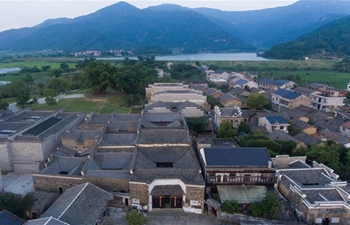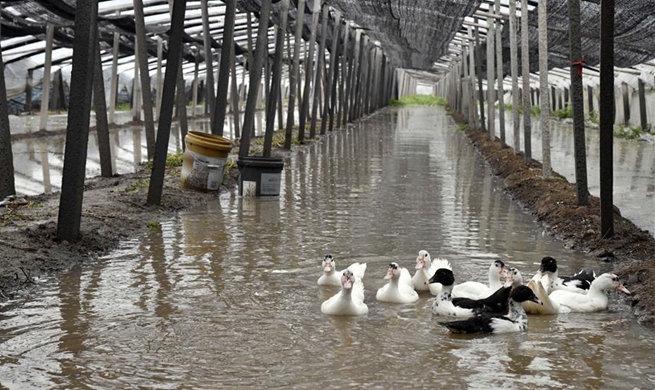ADDIS ABABA, Aug. 12 (Xinhua) -- The African Union (AU) on Monday urged its member countries to accelerate the integrated implementation of all existing international and regional commitments to mitigate the adverse effects of climate change.
The call was made by the AU Peace and Security Council in a statement issued on Monday that followed the Council's latest meeting that was held at the AU headquarters in Ethiopia's capital Addis Ababa under the theme "Natural and Other Disasters in Africa: Beyond the Normative Frameworks."
"Natural disasters and climate change contribute to exacerbating the existing tensions among communities, threaten the availability and access to vital resources and, disproportionately, affected the most vulnerable," the AU Peace and Security Council said in a statement issued on Monday.
Figures from the AU revealed that about 90 percent of natural disasters in sub-Saharan Africa are weather- and climate-related, which in turn affects the economic output of countries by 10 to 20 percent.
Noting the "urgent need for AU member states to reinforce measures to address effects of climate change, environmental degradation, and natural disasters," the Council also stressed African governments to expert particular emphasis to effective climate change measures in conflict-affected areas.
It also urged African countries to "redouble their efforts in preventing, managing and resolving conflicts within the context of the AU solemn declaration to Silence the Guns in Africa by the year 2020."
It further called on "all African countries to accelerate the integrated implementation of all existing international and regional commitments and agreements relating to mitigation of the effects of climate change."
According to the AU, among the major international and regional commitments on climate change include the Paris Agreement, the Montreal Protocol on Substances that deplete the Ozone Layer and the Sendai Framework for Disaster Risk Reduction (2015-2030) and its four priority areas for action to prevent new and reduce existing disaster risks.
It also emphasized the need to understand disaster risk, strengthen disaster risk management, invest in disaster reduction for resilience, as well as enhancing disaster preparedness for effective response.
The 55-member pan African bloc also urged its member African countries to develop "effective communication mechanisms on early warning on natural disasters."
It also recommended the establishment of command centers which operate on a 24-hour basis to closely monitor and timely issue early warning alerts on impending natural disasters, with a view to further enhancing national disaster risk preparedness and response capacities.
Urgent coordinated efforts at the national, regional and continental level also said to be vital towards planning and responding to potential natural disasters across the continent.
The Council also underscored the need to expedite operationalization of the African Humanitarian Agency (AfHA) so as to support AU member countries on disaster risk preparedness and management.
Noting the importance of secured sustainable funding for effects of climate change on the continent, the AU also commended countries that have already established special funding for the response to natural disasters.
It also called on other countries, which have not yet done so, to establish special funding schemes to effectively finance potential natural disaster mitigation efforts.
The Council also appealed to its development partners in particular and the international community, in general, to enhance their support to the African Union-led efforts in the response to natural disasters in Africa.













